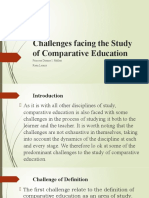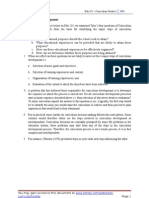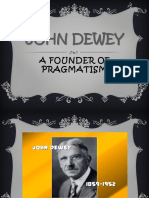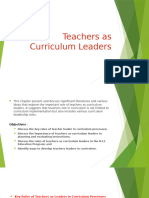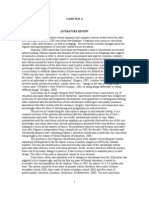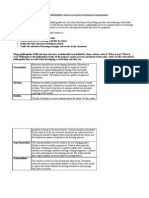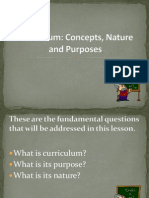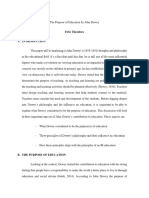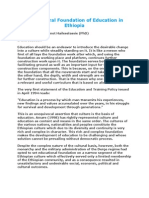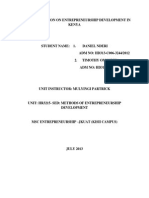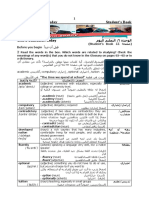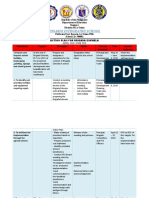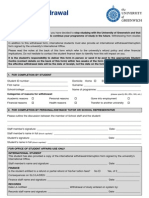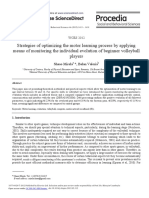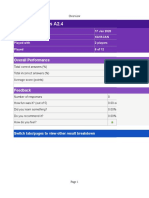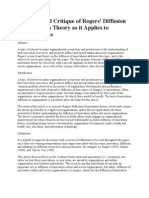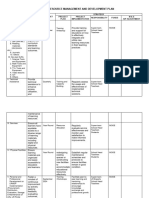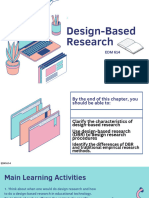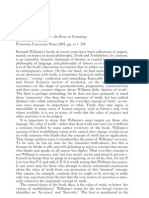Citizenship Education
Citizenship Education
Uploaded by
isankurniaCopyright:
Available Formats
Citizenship Education
Citizenship Education
Uploaded by
isankurniaCopyright
Available Formats
Share this document
Read this document in other languages
Did you find this document useful?
Is this content inappropriate?
Copyright:
Available Formats
Citizenship Education
Citizenship Education
Uploaded by
isankurniaCopyright:
Available Formats
A U T U M N 2 0 0 0
I S S U E
2 4
12
CITIZENSHIP EDUCATION:
SOME LESSONS FROM OTHER COUNTRIES
The decision to include citizenship education in the National Curriculum marks an historic shift in the approach to this area in English schools. But research shows that there is no great tradition of explicit teaching in citizenship education in English schools or of voluntary and community service for young people. As a result, there are huge gaps in the knowledge and research base that underpins this area in England. David Kerr looks at what lessons can be learned from other countries where citizenship education is a recognised part of the school curriculum. Readership : primary, secondary,
INTRODUCTION
Citizenship education concerns the preparation of young people for their roles and responsibilities as citizens, and, in particular, the role of education (through schooling, teaching and learning) in that preparatory process. Citizenship education is highly topical in many countries at present, as the new century dawns and urgent consideration is given to how better to prepare young people for the challenges and uncertainties of life in a rapidly changing world. England is no exception to this period of review. Indeed the place and purpose of citizenship education in schools was re-examined in the National Curriculum review. The advisory group on Education for Citizenship and the Teaching of Democracy in Schools (Crick Report, 1998) set out the aims and purposes of citizenship education and how it could be successfully delivered, both within the school curriculum and through links between schools and the wider community. The advisory group defined citizenship education as made up of three strands that are interrelated but also distinct; they are: N social and moral responsibility; N community involvement; N political literacy. Citizenship is included in the revised National Curriculum, for the very first time. It is part of a non-statutory framework alongside Personal, Social and Health Education (PSHE) at key stages 1 and 2 from August 2000, and a new statutory foundation subject at key stages 3 and 4 from August 2002.
The decision to include citizenship education in the National Curriculum marks an historic shift in the approach to this area in English schools. Research shows that there is no great tradition of explicit teaching in citizenship education in English schools or of voluntary and community service for young people. As a result, there are huge gaps in the knowledge and research base that underpins this area in England. Given this lack of expertise, it was decided to see what lessons could be learned from other countries where citizenship education is a recognised part of the school curriculum. These lessons could then help to inform approaches to Citizenship in the revised National Curriculum.
THE THEMATIC STUDY
A thematic study was carried out in citizenship education in 1999 as part of the International Review of Curriculum and Assessment Frameworks (IRCAF) Project (2). The IRCAF Project involves an international review of curriculum and assessment frameworks in 16 countries and is managed by NFER for the Qualifications and Curriculum Authority (QCA). The 16 countries are Australia, Canada, England, France, Germany, Hungary, Italy, Japan, Korea, The Netherlands, New Zealand, Singapore, Spain, Sweden, Switzerland and the USA. Thematic studies are conducted into specific areas or themes in order to provide:
G G
richer descriptions of practice in the countries concerned clarification of context
A U T U M N 2 0 0 0
I S S U E
2 4
12
G
an analysis of fundamental issues, related to the English framework.
KEY LESSONS
A number of key lessons emerged from each of the central aspects that have implications for policy and practice in citizenship education in schools in England.
The citizenship education thematic study was designed to enrich our understanding of this area by examining a number of central aspects:
G G G G G
curriculum aims, organisation and structure teaching and learning approaches teacher specialisation and teacher training use of textbooks and other resources assessment arrangements.
Curriculum aims, organisation and structure
N Context the important role that context and culture play in developing effective policy and practice. What works in one cultural context cannot simply be adopted and expected to achieve the same ends somewhere else. It requires careful adaptation to suit the new context. This applies whether at national, regional, local, school or individual classroom level. For example, a number of newer democracies among the 16 countries reported difficulties when attempting to introduce ideas and practices from the longer-established democratic countries into their schools. This was very evident in Korea and Hungary.
The thematic study combined material from: the IRCAF Project; specific enquiries about citizenship education addressed to the 16 countries; discussion at the invitational seminar on Citizenship Education, held in London, in January 1999; and published sources such as the National Case Study chapters from Phase 1 of the IEA Citizenship Education Project (3). The combination of sources produced deeper insights into policy and practice in this area at the individual country level, and raised fundamental questions about aspects of citizenship education across countries.
FRANCE
In France, civics education is a well-established part of the statutory curriculum at primary and secondary school level. It aims to teach what the French call republican values such as equality, democracy, rights and duties. Topics addressed include the Declaration of Human Rights , appropriate behaviour at home and in school, moral and ethical issues, and acting responsibly. At primary level, pupils learn, through Discovering the World , about behaviour and rules within the class and school, respect for others and oneself and the rules for living together. They also learn to respect the rules and values of the school and to understand the traditions and institutions which underpin democracy in France. These include the struggle for universal suffrage and the role of the National Assembly. All compulsory subjects contribute to civics education. At secondary level, through Civics , linked to History and Geography, students follow a more structured programme. They begin by learning about human rights and responsibilities. They then learn about the values that make up a democratic society such as equality, solidarity, freedom, safety/security and justice. Finally, they learn about citizenship in France, Europe and around the world and receive general information on political institutions. However, as part of the reform of schools, new measures have recently been introduced for improving living together and good citizenship at school. Such measures emphasise the role of both the formal and informal curriculum in contributing to civics education. They include a new charter for every school, to be signed by teachers, pupils and parents, which defines everyones rights and duties. Civics, legal and social education are now to be taught to all students at secondary level. There are also to be education for citizenship and health lessons every two weeks, in addition to the civics classes. The aim of these lessons is to enable students to discuss and debate issues which are of interest to them. School councils are also to be set up in schools representing the interests of teachers and students.
A U T U M N 2 0 0 0
I S S U E
2 4
12
N Values that an explicit statement of shared values underpinning citizenship education can make a difference to policy, practice and outcomes. Those countries with a valuesexplicit tradition are better able to set out the aims and goals of citizenship education (policy), how those are to be delivered (practice) and what the end-results should be (outcomes) than those countries with a values-neutral tradition. However, it should be noted that clarity of aims does not guarantee successful outcomes. This has implications in England given the appearance for the first time of a statement of values underpinning the school curriculum. N Breadth citizenship education is broader than the formal curriculum, involving the hidden curriculum, whole-school and extracurricular activities, as well as pupils everyday experiences of life. Some countries are attempting to build these activities into the formal curriculum. For example, Japan has special activities, while Singapore has developed a community involvement programme and learning journeys around the key institutions. Other countries have left the choice to schools. In the USA there has been an expansion in service learning education based on active partnerships between schools and their local communities. It is a growing area of interest in England. Meanwhile some countries are strengthening the involvement of students in school or class councils.
APPROACHES TO CITIZENSHIP EDUCATION IN THE FORMAL CURRICULUM
Table 1 examines the curriculum for pupils aged five to 11 years, and what is termed in INCA as the primary phase. Table 2 looks at the curriculum for students aged 11 to 16 or 18.
The primary curriculum (ages 5 to 11 years)
Table 1. Organisation of citizenship education in the primary phase Country England Australia Canada France Germany Hungary Italy Japan Korea The Netherlands New Zealand Singapore Spain Sweden Switzerland USA Terminology Citizenship as part of combined PSHE framework Human society and its environment (HSIE) Social studies Civics as part of Discovering the World Sachunterricht People and society Social sciences Social studies, living experience and moral education A disciplined life and moral education Social structures and life skills Social studies Civics and moral education Knowledge of the natural, social and cultural environment Social sciences Social studies Social studies Approach Non-statutory Non-statutory Integrated Non-statutory Integrated Statutory core Separate and integrated Non-statutory Integrated Statutory core Integrated Statutory core Integrated Statutory core Separate and integrated Statutory core Separate Statutory core Integrated Statutory core Integrated Statutory core Separate and Integrated Non-statutory Integrated Non-core Integrated Non-statutory Integrated Statutory core Integrated Hours per week Schools to decide
Not specified Not specified 4 hours out of 26
Not specified 47% of curriculum time Not specified 175 x 45 min per year Varies dependent on year 80100 hours per year Not specified 3 x 30 min lessons 170 hours per year 885 hours over 9 years of compulsory schooling Not specified Time specified per week varies among states
A U T U M N 2 0 0 0
I S S U E
2 4
12
The major pattern in the primary curriculum is the organisation of citizenship education through an integrated approach of domains in many countries. It suggests a deliberate emphasis, particularly in the early years of this phase, on the integrated learning of the childs understanding of themselves with respect to topics and aspects. For example, France links civics with sciences, technology, history and geography under the heading Discovering the world. Hungary has eight curricular areas, one of which is People and society, while Spain uses the term Knowledge of the natural, social and cultural environment. Moral education is also an important component of citizenship education in many countries, particularly those in Southeast Asia. The striking example is that of Korea, which addresses citizenship education through the domain of a disciplined life an integrated course covering social studies and moral education. Time allocations indicate that moral education features heavily in early education. The same is true for Singapore, where moral education is part of mother tongue teaching, and for Japan. In some countries the range of the curriculum is extended as the primary phase progresses and there is increased time and focus on citizenship education. In Singapore, for instance, the sevenarea curriculum from grade 1 (including civics and moral education) is supplemented by the addition of social studies from grade 4, with subjects increasingly taught through the common medium of English as pupils progress.
The secondary curriculum (ages 11 to 16 or 18 years)
Table 2. Organisation of citizenship education in the lower and upper secondary phase Country England Australia Canada France Germany Hungary Italy Japan Terminology Citizenship Human society and its environment (HSIE) Social studies and also history, law, political sciences and economics Civics linked to history and geography Social studies linked to history, and economics People and society with specific social studies, civics and economics courses Civics linked to history and geography Social studies, history, geography and civics and moral education Approach Statutory Non-statutory Integrated Non-statutory Integrated Statutory core Separate and integrated Non-statutory Integrated Statutory core Integrated and specific Statutory core Separate and integrated Statutory core Integrated and specific Hours per week Schools to decide Not specified Not specified 34 hours out of 26 Not specified 1014% of curriculum time 4 hours 175 x 50 min per year (Grades 7 & 8) 140 x 50 min per year (Grade 9) 140 x 50 min per year (Upper secondary) Ranges 170 x 45 min to 204 x 45 min per year 180 hours over 3 years (age 1215) 24 hours per week (age 1618) Not specified 2 x 30 min lessons Integrated and specific Non-statutory 885 hours over 9 years of compulsory schooling Not specified Time specified per week varies among states
Korea The Netherlands
Social studies and moral education Civics and citizenship and social studies
Statutory core Integrated and specific Statutory core Integrated
New Zealand Singapore Spain Sweden Switzerland USA
Social studies Civics and moral education Civics linked to history, geography and social sciences Social sciences including history, geography and social studies Social studies Social studies including civics and government
Statutory core Integrated Statutory core Non-statutory Separate and integrated Non-core Integrated Non-statutory Integrated Statutory core Separate and integrated
A U T U M N 2 0 0 0
I S S U E
2 4
12
Citizenship education in the secondary curriculum is still organised through an integrated approach in most countries, but often as a discrete, explicit component alongside other subjects and aspects. The most common approach is through social studies or social sciences courses, where citizenship or civics is closely linked to the subjects of history and geography. For example, in Hungary the domain is entitled People and society but incorporates specific reference to social studies, civics and economics courses. In Japan, in junior high school (age 12+ to 15), social studies is divided into three subjects: geography, history and civics to be taught from 2002 alongside a new general studies course; and in high school (age 15+ to 18) social studies is divided into two subjects: civics, and geography and history together, and where civics is further subdivided into modern society, ethics and politics and economics. In The Netherlands citizenship education is part of history and civics at lower secondary level (age 12 to 15) and is an integral part of social studies (maatschappijleer ) courses, while in some Canadian provinces social studies is linked with history, law, political sciences and economics. In many countries, the range of subjects that relate to citizenship education is extended as the secondary phase progresses, taking in economics, law, commerce and political sciences. Moral education continues to be an important component in some countries, particularly those in South-east Asia. The other feature of the secondary phase is the increased time given to citizenship education, especially in the upper years of this phase. This reflects the growing maturity of students and their ability to handle complex, topical issues. It is spurred by the proximity of students to their entry into the world as full citizens, with legal, political, economic and social rights and responsibilities.
SINGAPORE
In Singapore, citizenship education is a component of an overall compulsory Civics and Moral Education (CME) programme in schools. The goal is to develop in pupils strength of character and integrity, which enables them to become responsible members of their family, society and nation. Civic education aims to win both the hearts and minds of pupils to take on leadership challenges in the future. Underpinning the CME programme is the Five Shared Values of Singapore : namely, Nation before community and Society above self; Family as the basic unit of society; Community support and respect for the individual; Consensus, not conflict; and Racial and religious harmony. Emphasis is also given to values such as love, care and concern, honesty, justice and respect for life. Civic education encompasses both the formal and informal curriculum in schools. The formal curriculum is based on themes and topics. The themes of CME in primary school are Character building, Bonding with family, Sense of belonging to school, Being part of a society and National pride and loyalty. The themes in secondary school are Character building, Family relationships, Community spirit and Our nation, our heritage and challenges ahead. Topics in secondary school include personal integrity, and participating in community life volunteering, system of government and responsibilities of citizens to the law. Teachers employ a range of strategies including role-plays, case studies, debates, group discussions and personal reflections. In the informal curriculum civic education is founded on the idea of the school as a microcosm of society. Pupils are involved in a Community Involvement Programme , which entails at least six hours of voluntary work in the community each year, and in a strong House-system in schools, centred on team spirit and leadership. They also participate in extracurricular activities such as Community Service Clubs, and in experiential activities such as Learning Journeys; these journeys familiarise pupils with factors underpinning Singapores development and the continued challenges of being a small nation state.
A U T U M N 2 0 0 0
I S S U E
2 4
12
JAPAN
In Japan, citizenship education is covered by the compulsory subjects of Living Experiences and Social Studies in primary school, and Social Studies, History, Geography and Civics in secondary school. It is also addressed through the theme of moral education which runs alongside the subjects in the curriculum. The main goal is to develop pupils into selfreliant citizens of a peaceful and democratic state and community with a respect for human values. This is at the heart of the objectives for education, which are the development of broad-mindedness, a healthy body and creativity in individuals; the rearing of a spirit of freedom, self-reliance and public awareness; and educating the Japanese individual to live in the global human society. Citizenship education encompasses largely the formal curriculum in schools. At primary level, Living Experiences includes topics such as family and friends, animals, transport and community services, while Social Studies covers history and geography. At secondary level, Social Studies is divided into history, geography and civics. For older students, civics is further subdivided into modern society, politics, economics and ethics. However, there are also activities in the informal curriculum at both primary and secondary level. These include special activities, with an emphasis on volunteering and environmental activities in school and in the local community, student councils and whole-school events. Teaching is determined by ministry-approved textbooks, which traditionally emphasise teacher-led instruction and the acquisition of knowledge by pupils. However, there are currently reforms under way to modernise schools and the curriculum. These place less emphasis on knowledge acquisition and more on creativity, reflection and individualism. The subjects associated with citizenship education are at the heart of the drive for more flexibility. This drive involves the encouragement of a broader range of teaching and learning approaches. There is to be less reliance on textbooks and more use of discussion, debate, themes and activities inside and outside school. A new compulsory subject of General Studies is to be introduced in primary and secondary schools from 2002. The subject is based on a draft list of non-compulsory themes, which include international understanding, social welfare, environment and information systems. There are no plans for either approved textbooks and/or for guidance on teaching and learning approaches.
Teaching and learning approaches
N Range a move in many countries away from a narrow, knowledge-based approach to citizenship education, to a broader approach encompassing knowledge and understanding, active experiences and the development of student values, dispositions, skills and aptitudes. For example, there is evidence in Australian classrooms of structured discussion and debate as the most favoured approach. In the USA there are many opportunities for learning through extracurricular activities and through service learning programmes, national competitions and mock elections. However, it is accepted in all countries that there is still a substantial variety in approach from school to school and classroom to classroom. This means that not all pupils experience all approaches.
N Teacher culture the transition to a broader approach is proving difficult to manage in a number of countries because of the impact, in particular, of teacher culture and beliefs and the slow adaptation of schools to change. Countries with a tradition of a formal, knowledge-based approach to citizenship education can find it especially difficult to change teacher attitudes and opinions. This is the case in Hungary, where official moves to a more discussion-based approach to citizenship issues in classrooms are being frustrated by the deep-seated belief of teachers that controversial or sensitive issues should be kept out of the classroom. Japan and Korea are encountering similar problems in their official attempts to promote more creativity in schools and in what are traditionally conformist and centralist societies. The power and durability of teacher culture should not
A U T U M N 2 0 0 0
I S S U E
2 4
12
be underestimated in attempts to review and renew citizenship education. N Gap the continuing gap between the rhetoric of policy and the reality of practice in many contexts, from the national level down to individual school and classroom level. In some countries the gap can appear where national policy is attempting to bring a significant shift in teacher attitude and classroom practice in a relatively short space of time, while in other countries the gap is an accepted part of the system. For example, in Italy there is a marked contrast for pupils between the open, participative climate within the hidden curriculum and the nonparticipative climate within the formal curriculum in classrooms. There is still a long way to go to ensure that effective practice in citizenship education is developed and sustained within and across countries.
Teacher training and use of resources
N Centrality agreement on the centrality of the teacher in citizenship education and on the need for better targeted training for teachers and the development of a broader range of teacher-friendly resources. N Inadequacy a number of countries commented on the inadequacy of the preparation of teachers to handle citizenship education in the school curriculum. This relates not only to a lack of teachers content knowledge, but also to an inability to employ a range of teaching and learning approaches appropriate to citizenship education. There is a need through training to enable teachers to reflect on their own practice in order to improve it.
AUSTRALIA
In Australia, citizenship and civics in schools are located in the area of the curriculum, Human society and its environment. The federal government has launched a large-scale project, Discovering Democracy: School Materials Project, to support citizenship education in schools. The aim of the Project is to help schools ensure that all young Australians are equipped to play their part as citizens. This requires knowledge and the development of skills and attitudes that enable effective participation. The Project contains an overarching curriculum framework for citizenship education. This is made up of four organising themes and linked curriculum units. Pupils encounter and revisit these themes through different curriculum units across their time in schools. The four organising themes are: Who rules? This looks at sovereignty, power and the principles behind Australian democracy. It also examines the rights and responsibilities of citizens. Law and rights This examines the rule of law, the legal system and the roles of constitutions, parliaments and courts. The Australian nation This deals with Australias democratic institutions, changes in civic identity and role as a nation. Citizens and public life This deals with the way people contribute in Australian society to public and community life. The curriculum units include, for example, for the theme Citizens and public life , Joining in and People power (primary school), and Men and women in political life and Getting things done (secondary school). Each unit contains teacher notes and a series of learning activities. These are part of the classroom materials and professional development activities, which have been produced for teachers. They include CD-ROMs, a website, teacher magazine, videos, classroom books, posters and cards. Learning materials and activities have been designed with a strong emphasis on stimulating pupil interest and active engagement. There are opportunities for research, analysis, interpretation, participation and discussion through a wide range of approaches. These include presentations, projects, inquiries and active citizenship both at school and in the wider community.
A U T U M N 2 0 0 0
I S S U E
2 4
12
N Textbooks these still underpin the teaching of citizenship education in most countries. They play an important role in determining the approach in classrooms and therefore in shaping pupil experiences. There is a danger when there is an over-reliance on textbooks which emphasise acquisition of knowledge above more active, participatory experiences, for this can sometimes disaffect both teachers and pupils. N Innovation there is a move in some countries to expand the range of resources that support citizenship education. This involves the growing use of information and communications technologies (ICT). For example, in both Korea and New Zealand, the Ministries of Education run on-line telecommunications networks linked to schools, which produce a wide range of curriculum materials in a range of formats. The challenge in all countries is to adapt materials in a form which suits the needs of busy teachers.
CONCLUSION
The thematic study helped to alleviate concerns that the lack of a strong tradition in citizenship education in schools in England is a major disadvantage in efforts to develop effective practice in schools. What the study highlighted, above all, is the commonality of interest, challenge and approach to citizenship education across countries. Once you get beyond the differences in context and in curriculum and assessment frameworks, countries have much more in common concerning citizenship education than they think. In particular, the study underlined:
G
Assessment arrangements
N Mixture most countries have a mixture of summative and formative assessment arrangements in citizenship education. Continuous pupil assessment is the responsibility of the individual class teacher, with formative assessment introduced at a number of natural end-points across the school year. These sometimes coincide with points of transition and exit in the school system, where formative assessment may be part of more formal national procedures. N Clarity of purpose the most important issue when deciding on assessment arrangements is clarity of purpose: the need to be clear about what is being assessed, how, for what purpose and with what impact on teaching and learning approaches. There is a growing debate in some countries about the desirability of terminal, written exams for citizenship education, as part of compulsory, national assessment systems, and their balance with other types of assessment.
The topical nature of citizenship education and the breadth and complexity of the issues it addresses. The area is under review in most of the 16 countries, not just in England, as part of an overall review of the school curriculum. The broad agreement among countries on the common challenges facing citizenship education, even if national responses to those challenges vary. The need for urgent coordination and dissemination of approaches, programmes and initiatives in citizenship education which are developing effective practice. This is best achieved through the establishment of a citizenship education database within and across countries.
While England can undoubtedly learn from what is happening in other countries, there is also tremendous interest, in those countries, in what is happening in England at the moment. If the vision of the Citizenship Advisory Group, to effect active and participatory citizenship education for all pupils, is to be met, then we need to encourage more dialogue and exchange of ideas between all those with an interest in citizenship education researchers, teachers, policy-makers, curriculum designers, government officials, parents and pupils. The thematic study proved the benefits of such dialogue. This spirit of partnership is surely the best way to respond to the current challenges in citizenship education.
A U T U M N 2 0 0 0
I S S U E
2 4
12
Further reading Address for correspondence
1 CRICK REPORT. GREAT BRITAIN. DEPARTMENT FOR EDUCATION AND EMPLOYMENT. ADVISORY GROUP ON EDUCATION FOR CITIZENSHIP AND THE TEACHING OF DEMOCRACY IN SCHOOLS (1998). Education for Citizenship and the Teaching of Democracy in Schools: The Final Report of the Advisory Group on Citizenship. London: QCA. 2 KERR, D. (1999a). Citizenship Education: An International Comparison. London: QCA/NFER. 3 KERR, D. (1999b). Re-examining Citizenship Education: The Case of England. Slough: NFER.
David Kerr, Senior Research Officer, NFER, The Mere, Upton Park, Slough, Berkshire SL1 2DQ. Tel: (01753) 574123; Fax: (01753) 691632; Email: d.kerr@nfer.ac.uk
Copying Permitted
The NFER grants to educational institutions and interested bodies permission to reproduce this item in the interests of wider dissemination.
You might also like
- Curriculum StudiesDocument12 pagesCurriculum StudiesBonnieArmstrongGreeneNo ratings yet
- Challenges Facing The Study of Comparative Education: Princess Dianne I. Mallari Rean LeonisDocument10 pagesChallenges Facing The Study of Comparative Education: Princess Dianne I. Mallari Rean LeonisJewels GarciaNo ratings yet
- Curriculum ProcessDocument3 pagesCurriculum Processapi-3731537100% (7)
- Basic Education beyond the Millennium Development Goals in GhanaFrom EverandBasic Education beyond the Millennium Development Goals in GhanaRating: 5 out of 5 stars5/5 (1)
- Determinants of Education System: by DR - Alice MwesigwaDocument26 pagesDeterminants of Education System: by DR - Alice MwesigwaKatongole DavidNo ratings yet
- Learning StyleDocument22 pagesLearning Stylepaovent88% (8)
- The Four Major Philosophical School of ThoughtsDocument2 pagesThe Four Major Philosophical School of ThoughtsRACQUEL DELOS SANTOSNo ratings yet
- Historical Foundations of Education CalderonDocument94 pagesHistorical Foundations of Education CalderonCris OlipasNo ratings yet
- Rogan (2003)Document34 pagesRogan (2003)let's skip thisNo ratings yet
- Presentation On John DeweyDocument20 pagesPresentation On John DeweyCheanndelrosarioNo ratings yet
- Foundation of EducationDocument54 pagesFoundation of Educationdavid john ubera100% (1)
- Doctor of Philosophy: Foundation CoursesDocument5 pagesDoctor of Philosophy: Foundation CoursesjosephcruzNo ratings yet
- Assignment 2 (0838)Document20 pagesAssignment 2 (0838)ZUBAIR100% (1)
- Critical Analysis: Curriculum Development: A Guide To PracticeDocument3 pagesCritical Analysis: Curriculum Development: A Guide To PracticeHina Kaynat100% (1)
- Learner-Centered Psychological PrinciplesDocument15 pagesLearner-Centered Psychological PrinciplesShailanie Valle RiveraNo ratings yet
- Constructive Alignment 1 PDFDocument14 pagesConstructive Alignment 1 PDFKlarissa JsaninNo ratings yet
- Code No. 838 Assignment 1Document18 pagesCode No. 838 Assignment 1Tmo KhwazakhelaNo ratings yet
- Educational Research in Nigeria Some Local Forces Inhibiting Progress and The Way ForwardDocument7 pagesEducational Research in Nigeria Some Local Forces Inhibiting Progress and The Way ForwardAhmed Sa'idNo ratings yet
- Connectivism Theory of Learning-1Document10 pagesConnectivism Theory of Learning-1Elsa Disma TepaNo ratings yet
- Teachers - As - Curriculum - Leaders - of 21st Century LearningDocument15 pagesTeachers - As - Curriculum - Leaders - of 21st Century LearningleamartinvaldezNo ratings yet
- Research and Thesis WritingDocument11 pagesResearch and Thesis WritingGenner RazNo ratings yet
- Written Report: Educ501 - Foundations of EducationsDocument21 pagesWritten Report: Educ501 - Foundations of EducationsEmily PanganibanNo ratings yet
- Performance Based AssessmentDocument7 pagesPerformance Based AssessmentAwatif AuniNo ratings yet
- Final PPT DeweyDocument10 pagesFinal PPT DeweySoledad Rodríguez PascualNo ratings yet
- Topic 6: John Dewey On EducationDocument9 pagesTopic 6: John Dewey On EducationNanthini KanapathyNo ratings yet
- Basic Education in Nigeria: Problems and SolutionsDocument7 pagesBasic Education in Nigeria: Problems and SolutionsCentral Asian StudiesNo ratings yet
- Syllabuses From Grade 9 12 FINAL Version Revised March 2022Document69 pagesSyllabuses From Grade 9 12 FINAL Version Revised March 2022abdimoh7522No ratings yet
- Approaches To Curriculum DesignDocument13 pagesApproaches To Curriculum DesignRamel PaglanganNo ratings yet
- Contribution of PsychologyDocument2 pagesContribution of PsychologyLalramngaihawmiNo ratings yet
- Methodological Approaches in Comparative EducationDocument17 pagesMethodological Approaches in Comparative EducationManas BeckNo ratings yet
- Implementation of Physics Syllabus in SS Schools in NigeriaDocument14 pagesImplementation of Physics Syllabus in SS Schools in NigeriaOlowookere Israel Oluwatobi50% (2)
- Education PhilosophiesDocument3 pagesEducation PhilosophiesCanute Mcinnis100% (1)
- Philosophy of Catholic EducationDocument1 pagePhilosophy of Catholic Educationapi-307825430No ratings yet
- Definition of CurriculumDocument2 pagesDefinition of Curriculumseenauth tarachanNo ratings yet
- Tanzania Education PolicyDocument13 pagesTanzania Education PolicyHOPE100% (1)
- Teacher - Centered and Learner - Centered Approaches To InstructionDocument6 pagesTeacher - Centered and Learner - Centered Approaches To InstructionJose Idelfonso100% (1)
- Tecs-: By:Temesgen Yadeta (M.A Assistant Professor)Document85 pagesTecs-: By:Temesgen Yadeta (M.A Assistant Professor)Usmaan Gammachuu100% (1)
- Understanding Culture, Society and Politics Lesson: Social Institution of Education (Week 2)Document5 pagesUnderstanding Culture, Society and Politics Lesson: Social Institution of Education (Week 2)kimchuNo ratings yet
- Readings in the History of Education Mediaeval UniversitiesFrom EverandReadings in the History of Education Mediaeval UniversitiesNo ratings yet
- Development: CognitiveDocument15 pagesDevelopment: CognitivesivakumarNo ratings yet
- Development Studies 1st Notes-1Document23 pagesDevelopment Studies 1st Notes-1charlesNo ratings yet
- 4 Importance of Effective Budgeting in MalaysiaDocument1 page4 Importance of Effective Budgeting in Malaysiasarjanaaa100% (2)
- All Believers Prayer Fellowship, World Wide - Constitution 2020 Edited OneDocument17 pagesAll Believers Prayer Fellowship, World Wide - Constitution 2020 Edited OneEmmanuel BoakyeNo ratings yet
- CurriculumDocument30 pagesCurriculumMarvin VinasNo ratings yet
- Recognising Learning: Educational and Pedagogic Issues in e - Portfolios - Graham AttwellDocument7 pagesRecognising Learning: Educational and Pedagogic Issues in e - Portfolios - Graham AttwellGraham AttwellNo ratings yet
- Febe Theodora - WA 1 - John Dewey's Philosohy of EducationDocument5 pagesFebe Theodora - WA 1 - John Dewey's Philosohy of EducationQueen_th100% (1)
- What Is DoctrineDocument3 pagesWhat Is DoctrineIjuo Benjamin PromisebjprofeNo ratings yet
- Curriculum DevelopmentDocument56 pagesCurriculum DevelopmentKatarina EnDesNo ratings yet
- The Cultural Foundation of Education in EthiopiaDocument8 pagesThe Cultural Foundation of Education in EthiopiaelhamseidNo ratings yet
- 3.1. Pedagogical Theories Supporting The Use of ICT PDFDocument21 pages3.1. Pedagogical Theories Supporting The Use of ICT PDFRobert Johnson33% (3)
- Economic Issues On Globalization in EducationDocument4 pagesEconomic Issues On Globalization in EducationJhon Rey Balbastro100% (1)
- Republic of The Philippines Commission On Higher Education Region VDocument9 pagesRepublic of The Philippines Commission On Higher Education Region VshielaNo ratings yet
- PGCE Round Table DiscussionsDocument5 pagesPGCE Round Table Discussionsabimassey100% (1)
- CPE 108 Module 1 1Document18 pagesCPE 108 Module 1 1Mark MaataNo ratings yet
- Classroom Management Practices and LearnDocument16 pagesClassroom Management Practices and LearnNapoleonNo ratings yet
- Education Paper 5 History PDFDocument72 pagesEducation Paper 5 History PDFbeing pahadiNo ratings yet
- Different Approaches and Methods FalDocument38 pagesDifferent Approaches and Methods Faljami hingNo ratings yet
- Reflective InquiryDocument33 pagesReflective InquiryMahwish B. HussainNo ratings yet
- Educational PhilosophiesDocument4 pagesEducational PhilosophiesZaib RehmanNo ratings yet
- Role of Education in Entrepreneurship Development in KenyaDocument15 pagesRole of Education in Entrepreneurship Development in KenyaDaniel100% (1)
- Chapter 4 Application LetterDocument7 pagesChapter 4 Application LetterMaulina .2034No ratings yet
- EDUP 3073 Culture and Learning: Juvenile Education ProgrammesDocument9 pagesEDUP 3073 Culture and Learning: Juvenile Education ProgrammessunshinesunshineNo ratings yet
- BSOM071 AS1 Assessment Brief - AUT 2324 - Oct 27Document4 pagesBSOM071 AS1 Assessment Brief - AUT 2324 - Oct 27Ahmed YusufNo ratings yet
- Unit 6: Education Today Student's BookDocument21 pagesUnit 6: Education Today Student's BookRahaf HowariNo ratings yet
- Rosario Integrated School: Objectives Targets Strategies Movs Persons Involved Time Success IndicatorDocument4 pagesRosario Integrated School: Objectives Targets Strategies Movs Persons Involved Time Success IndicatorErnani Moveda Florendo100% (1)
- Withdrawal FormDocument2 pagesWithdrawal FormLlamaLifeNo ratings yet
- Topic 1.what Is PhilosophyDocument9 pagesTopic 1.what Is PhilosophyNueh KimonNo ratings yet
- I. Multiple ChoiceDocument5 pagesI. Multiple ChoiceBrian AquinoNo ratings yet
- Bugarin National High School: Department of EducationDocument6 pagesBugarin National High School: Department of EducationNick TejadaNo ratings yet
- Strategies of Optimizing The Motor Learning Process by Applying Means of Monitoring The Individual Evolution of Beginner Volleyball PlayersDocument6 pagesStrategies of Optimizing The Motor Learning Process by Applying Means of Monitoring The Individual Evolution of Beginner Volleyball PlayersYoga TamaNo ratings yet
- Review of Tenses A2.4Document83 pagesReview of Tenses A2.4eltcanNo ratings yet
- A Review and Critique of RogersDocument14 pagesA Review and Critique of Rogersyilento50% (2)
- Demographic Correction After The Declaration of Result Conducted by CBSE-regDocument1 pageDemographic Correction After The Declaration of Result Conducted by CBSE-regShivabhod S Shivabhod SNo ratings yet
- S4Es-Ivb-2: Chapter 2-Water in The Environment Lesson 59: Uses of Water From The Different SourcesDocument5 pagesS4Es-Ivb-2: Chapter 2-Water in The Environment Lesson 59: Uses of Water From The Different SourcesEmily M100% (2)
- Gitelman Lisa Pingree Geoffrey B Eds. - New Media 1740-1915Document306 pagesGitelman Lisa Pingree Geoffrey B Eds. - New Media 1740-1915Mittsou100% (2)
- Planets and HousesDocument19 pagesPlanets and HousesgvnikiNo ratings yet
- LRMD Plan TemplateDocument3 pagesLRMD Plan TemplateMae Ann Base RicafortNo ratings yet
- Level 8.2 12 Adv English Assessment Term 3 2023-2024Document13 pagesLevel 8.2 12 Adv English Assessment Term 3 2023-2024Ivana JocicNo ratings yet
- Balancing Act Homework Activity 1 and 2Document7 pagesBalancing Act Homework Activity 1 and 2mheojhun100% (1)
- Project Management-A Systems Approach To Planning, Scheduling and ControllingDocument17 pagesProject Management-A Systems Approach To Planning, Scheduling and ControllingAtuha PeterNo ratings yet
- Warehousing Services NC IIIDocument143 pagesWarehousing Services NC IIIAnskey berthomeNo ratings yet
- Job PDSDocument4 pagesJob PDSacelaerdenNo ratings yet
- Del Sur NewsDocument28 pagesDel Sur NewsKelvin MarshallNo ratings yet
- Best Neurosurgery Residency Programs 2016Document12 pagesBest Neurosurgery Residency Programs 2016Neurosurgery Residency Programs 201650% (2)
- 0580 s12 QP 42Document16 pages0580 s12 QP 42Aryan RajputNo ratings yet
- Gazette Annual Inter Part-I (11th) 2021Document521 pagesGazette Annual Inter Part-I (11th) 2021MrrobinNo ratings yet
- Design-Based ResearchDocument23 pagesDesign-Based ResearchYolanda LegaspiNo ratings yet
- NDEP Presentation-OK Sa DepEdDocument18 pagesNDEP Presentation-OK Sa DepEdOcir Ayaber83% (18)
- Rizal Law RA 1425Document1 pageRizal Law RA 1425WearIt Co.No ratings yet
- New Books: Truth and Truthfulness: An Essay in GenealogyDocument22 pagesNew Books: Truth and Truthfulness: An Essay in Genealogywux1327No ratings yet

